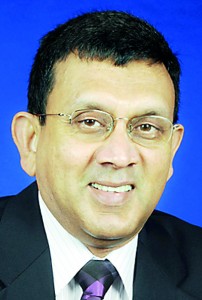Becoming a global winner in the knowledge economy
View(s):Electronic engineering senior lecturer Nihal Kularatna looks back over his academic career in Sri Lanka and New Zealand, and argues that students who want to prepare themselves for the knowledge economy should take full advantage of higher education opportunities overseas to gain a quality-assured education rather than just a qualification.

Nihal Kularatna -BSC Eng (Hons) C.Eng FIEE Senior Member IEEE
In Sri Lanka, we have the wrong view that “technology” resides in the high-tech boxes we use and manage in ICT environments. In fact, technology is a set of creative products of human brain power. So are our young people ready to embrace the rigours of a true higher education rather than simply gaining a qualification, or are we going to perish by becoming mere end users of “modern-technology”? Research and development on a global scale has set the knowledge economy on fast forward. In areas related to electronics and communications, engineering knowledge half life today is a mere three to five years – and even in other scientific fields, the knowledge domain is continually expanding.
Our younger community should be able to dream of achieving global careers, by actively serving the knowledge business. But they need the right environment to give full play to their talents and abilities.
Developed countries always place an emphasis on research and development, and the intellectual property domain. Higher education institutions and the R&D community place high value on postgraduate research, industry-university partnerships and the process of acquiring world-wide patents and copyrights.
In my decade-long full-time academic career in New Zealand I have seen firsthand the allocation of resources based on genuine outputs rather than mere politically motivated resource inputs. For example during my 16-year career at the Arthur C Clarke Institute career, I genuinely acquired many skills and expertise, but I only reaped the rewards of these many years later when I was challenged by the academic systems in a developed country to produce world class scientific outputs.
Given this, my advice to the younger community and their parents is to consider the education opportunities in the developed world, if financial resources allow. A good four year internationally recognised degree program with industry placements, or a science or engineering degree with a parallel management degree (a conjoint degree registration) can be a very fine start.
In many recognised universities in developed countries, hard-working undergraduates can expect scholarship opportunities, research grant based postgraduate options, or the chance to participate in industry-university programmes. Such opportunities give fine openings to further expand one’s expertise in specific areas.
A quality assured higher education system trains young people to take on the challenges in the knowledge economy. Compare this to the case of a young person in a developing country “completing a degree” and then trying to use the paper qualification to get “a good job”. In a quality-assured, internationally benchmarked education environment, a well skilled educated young person masters many things – communication skills, creative problem-solving skills, documentation skills — in addition to gaining the paper qualification. This trains you to be critical thinker, and look at the rest of the world through others’ published work – helping you overcome the science and engineering knowledge half-life issue. Industries which reap the benefits of the knowledge economy are eager to employ such people in their early recruitment programs.
Couple life-long education with detail-minded hard work, and you could be a global winner in the knowledge economy!
Nihal Kularatna is a Senior Lecturer in Electronic Engineering at the University of Waikato in Hamilton, New Zealand. He leads a research team active in the areas of DC power supply topologies, AC power conditioning, transient and surge protection, and his work has resulted in a number of international patents.
Follow @timesonlinelk
comments powered by Disqus

























